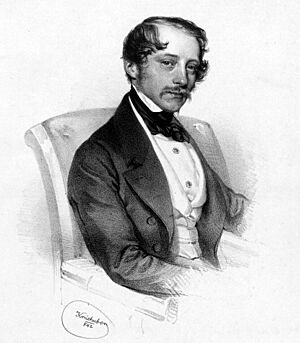Otto Nicolai facts for kids
Carl Otto Ehrenfried Nicolai (born June 9, 1810 – died May 11, 1849) was a talented German composer and conductor. He was also one of the people who helped start the famous Vienna Philharmonic orchestra.
Nicolai is most famous for his opera based on Shakespeare's funny play, The Merry Wives of Windsor. In German, this opera is called Die lustigen Weiber von Windsor. Besides his five operas, Nicolai also wrote many other types of music. This included songs (called lieder), pieces for orchestras, choirs, musical groups, and solo instruments.
Contents
About Otto Nicolai
Otto Nicolai was born in Königsberg, Prussia, and was a child prodigy. This means he was incredibly talented in music from a very young age. His first music lessons came from his father, Carl Ernst Daniel Nicolai, who was also a composer.
When he was a teenager in 1826, Nicolai left his home. He found help from a kind legal official named August Adler in Stargard. Mr. Adler treated Nicolai like his own son. When Nicolai was 17, Adler sent him to Berlin to study music with a famous teacher named Carl Friedrich Zelter.
Early Success and Italy
Nicolai quickly became successful in Germany. He wrote his first symphony in 1831 and held public concerts. After these early achievements, he moved to Rome. There, he worked as a musician for the Prussian embassy.
He wrote most of his operas in Italian, which was very popular at the time. His last and most famous opera, The Merry Wives of Windsor, was the only one he wrote in German. For a while, he was even more popular in Italy than the famous composer Giuseppe Verdi.
Return to Vienna and Berlin
In the early 1840s, Nicolai became a very important person in the music scene in Vienna. He was offered a job as a Kapellmeister (a music director) at the Berlin Cathedral in 1844. This was the same job that Felix Mendelssohn had held before him. However, Nicolai did not move back to Berlin until the last year of his life.
His Final Days
On May 11, 1849, Otto Nicolai sadly passed away from a stroke. This was just two months after his most famous opera, The Merry Wives of Windsor, first opened. It was also only two days after he was given a new important job as Hofkapellmeister at the Berlin Staatsoper. On the very day he died, he was also chosen to be a member of the Royal Prussian Academy of Arts.
Otto Nicolai's Music
Otto Nicolai wrote many different kinds of music during his life. He is best known for his operas, but he also composed symphonies, church music, and many songs.
Operas
Nicolai wrote several operas, which are plays set to music. His most famous opera is:
- Die lustigen Weiber von Windsor (1849) – This is a funny opera based on Shakespeare's play.
Other operas he wrote include:
- Rosmonda d'Inghilterra (1839)
- Il templario (1840) – This opera was later revised and called Der Tempelritter (1845).
- Gildippe ed Odoardo (1840)
- Il proscritto (1841) – This opera was later revised and called Die Heimkehr des Verbannten (1844).
Other Music Works
Besides operas, Nicolai composed many other pieces:
- Symphonies: He wrote two symphonies, which are large musical pieces for an orchestra.
- Church Music: He composed several religious works, including a Mass in D major, a Te Deum, and several Psalms.
- Concertos: He wrote a Concertino for Trumpet and Orchestra.
- Songs and Duets: Nicolai wrote many songs for singers, often with piano accompaniment. These include "Wenn sanft des Abends" and "Rastlose Liebe."
- Piano Music: He also composed pieces for the piano, such as sonatas and etudes.
- Other Pieces: This includes music for choirs and special pieces for instruments like the French horn and clarinet.
See also
 In Spanish: Carl Otto Nicolai para niños
In Spanish: Carl Otto Nicolai para niños
 | Audre Lorde |
 | John Berry Meachum |
 | Ferdinand Lee Barnett |


